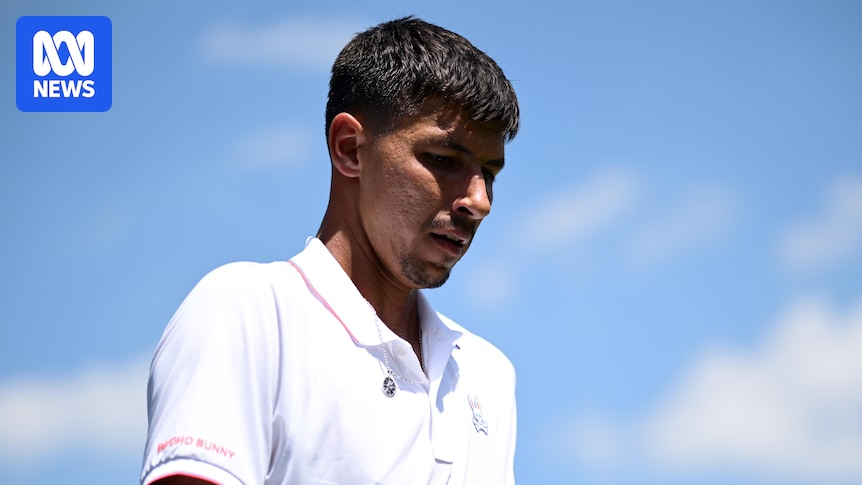
George Orwell’s 1984 and an Ed Sheeran B-side are not typically uttered in the same sentence. Yet, this curious combination of dystopian science fiction and global pop music helped Australian tennis player Alexei Popyrin disconnect from the pressures of professional tennis. Following a shocking first-round exit at Wimbledon in late June, where he lost to world number 461 Arthur Fery, Popyrin realized he needed a break.
“I was numb,” he told ABC Sport. “I didn’t feel sad. I didn’t feel happy. I just felt kind of like, yeah, this is what happens and I’ve never had that feeling before in my career, so for me it was very important to kind of figure out why very quickly and take some time for myself and my team.”
Last month, the 26-year-old and his fiancée, Amy, flew to Bermuda, where Popyrin rediscovered his love of books. He has since read a book a week, immersing himself in the sci-fi and fantasy genres. “I’m reading this series called Red Rising and it’s been really good but right now I’m reading a classic book called 1984 by George Orwell,” he said. “It was really nice to disconnect and spend time with the people that I love.”
Reconnecting with Passion and Music
During his time off, Popyrin also indulged in another passion: music. The couple attended a homecoming concert by Ed Sheeran, their favorite musician, in Ipswich, England. “My favorite Ed Sheeran track is probably one that not many people know. It’s called ‘You Need Me, I Don’t Need You,'” explains the long-time fan.
Despite reaching a career-best ranking of 19 this month, 2025 has been challenging for Popyrin. He dropped 18 places just before the US Open but remains Australia’s second-ranked male player, behind Alex de Minaur. A change in coaching staff and a dip in his mental health have presented hurdles. However, Popyrin believes he is a better player now than he was last year when he claimed the biggest win of his career by defeating Novak Djokovic in the third round of the US Open.
Consistency: The Next Goal
The win over Djokovic in New York last year was part of a dream run for Popyrin, which included winning his maiden Masters 1000 title—the first Australian to do so since Lleyton Hewitt in 2003. This year’s US Open presents another opportunity to demonstrate his ability as a consistent performer.
“I’ve always been able to show up for the big matches against the big guys and cause trouble for them. But I’ve also not been consistent in beating the players that I should be beating,” he said. The tall Australian faces a challenging draw but is undaunted by the prospect of playing world number one Jannik Sinner in the second round at Flushing Meadows. “I’m the kind of player that enjoys those kind of matches, but all focus on the first round right now,” said Popyrin, who has drawn Finnish player Emil Ruusuvuori first up.
Addressing Burnout and Scheduling
After navigating burnout, Popyrin believes he is on the right path to finding consistency. “Burnout is a very, very big thing in tennis right now,” Popyrin said. “And I think a lot of it has to do with the two-week schedules, two-week Masters events. It’s a new thing that the coaches and the players don’t really know or are 100 percent capable of scheduling correctly just yet.”
“I was never one to kind of really focus on my mental health … I wasn’t really one to think that I could really burn out,” Popyrin said. “But after that Wimbledon [loss], I had to take a step back and figure out where did it all go wrong and where did we kind of make a mistake in terms of scheduling.”
Burnout continues to plague the professional tennis circuit, with de Minaur joining the chorus of players who say there is too much tennis. “We figured it out quite quickly and … rectified it. When you’re young and you’re motivated you can play a lot of tournaments but as you get older… it starts to become a grind. Right now, I’m being called a veteran on tour, which is crazy. But I think I’ve learned a lot about myself and the way that I approach my whole career and I’m definitely taking a different outlook on it right now.”
As the US Open unfolds, Popyrin’s journey will be closely watched by fans and analysts alike. His path to consistency may serve as a blueprint for other players grappling with the demands of modern tennis.





